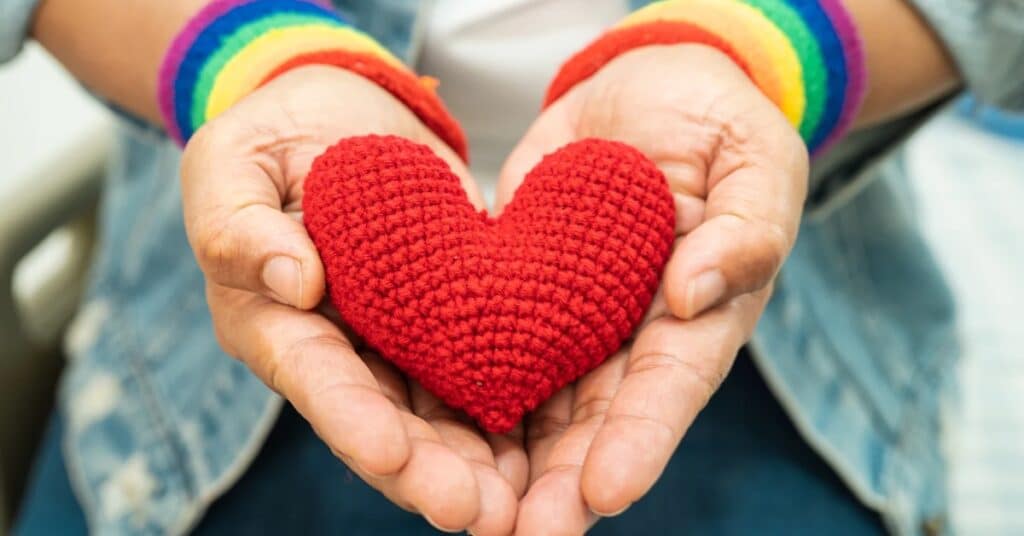A Parent’s Love Knows No Gender
By Kayleen Holt

“I don’t care what gender my baby is, as long as it’s healthy.”
We often say this when we’re expecting. But do we mean it?
With my second pregnancy, I was convinced I was carrying a boy. Everything felt different than when I’d carried my daughter two years earlier. Surely it was a boy. But in the second ultrasound, my baby was bottoms-up with no dangly bits in sight. I was proven wrong—or so my husband and I thought.
As it turns out, we did have a son. It just took 25 years for us to find out.
That’s how long my son struggled internally because his upbringing and society were telling him he was a girl, while all along he knew something didn’t feel right about that.
Understanding Gender
It might be hard to understand at first how someone born with female parts is, in fact, a man. But that’s because we’ve been taught that sex and gender are the same. People have “gender” reveal parties to announce the baby’s sex (because “genital reveal party” just sounds wrong).
But studies show that gender is determined in the brain, and transgender people’s brain structures align more closely with their authentic gender than with their sex assigned at birth. These findings are why the term “biological sex” doesn’t really mean what many people think—because the brain is part of our biology as well. It’s not a simple matter of choosing a gender or “feeling” like a boy instead of a girl (or vice versa). Gender is engrained in the brain’s anatomy.
My Son’s Journey
Growing up in the Bible Belt, my son heard over and over that being gay was a sin and that transgender people were perverts and pedophiles. He knew those things weren’t true, but he internalized those harmful messages anyway, causing him to feel shame about who he was. He denied his identity for years.
As a child, he loved playing in the dirt, discovering bugs, and roughhousing with his dad. He also loved wearing dresses and staging elaborate dramas with his dolls. As he got older, he leaned into “girly” things more. He grew his thick, blonde hair so long that people called him Rapunzel. He wore a pink, sparkly princess gown to prom. His makeup was flawless. He was trying desperately to fit into the box society had put him in. “I thought if I acted more like a girl,” he told me recently, “I would feel more like a girl.”
Mental Health Impact
Denying who we are comes with a cost. For years, my son has battled anxiety, depression, and other mental health challenges, including suicidal thoughts. Ten months before coming out as a trans man, he attempted to take his own life.
I don’t know if you’ve ever sat helplessly in the emergency room not knowing if your child was going to live, but it has a way of making every other concern fall away. If I said “as long as it’s healthy” flippantly when I was pregnant, in that moment when his life was on the line, my son’s health truly was the only thing that mattered.
Months later, when he told me he was starting testosterone because he was really a guy, I wasn’t shocked, upset, or confused. I was relieved. The crushing burden he’d clearly been carrying was finally getting lighter, as he was learning to live as his authentic self.
The Importance of Acceptance
I will never understand parents who reject their gay and trans children. How can a parent do anything but celebrate when their child finds love, no matter what gender they find it with? How can a parent’s love be shaken by their child’s gender? Yet, it happens every day. Up to 40% of youth experiencing homelessness identify as LGBTQ+. Most either were kicked out by their parents or ran away due to abuse or fear of abuse because of their identity.
What happened to “as long as it’s healthy”? What happened to a parent’s love being unconditional?
Since my son has been living as his true self, he is happier than I’ve ever seen him. That doesn’t mean his mental health challenges have gone away, but he is no longer living with the burden of pretending to be someone he is not. He still loves pink and glitter, but he is 100% boy. And I am proud to call him my son.
Learn more about supporting an LGBTQ+ loved one.
Author’s Note: This article was written with my son’s permission. Parts of it first appeared on my blog.


